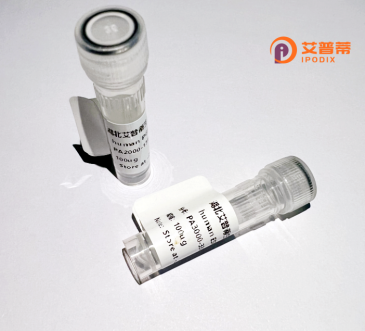
| 纯度 | >90%SDS-PAGE. |
| 种属 | Human |
| 靶点 | CBX4 |
| Uniprot No | O00257 |
| 内毒素 | < 0.01EU/μg |
| 表达宿主 | E.coli |
| 表达区间 | 1-560aa |
| 氨基酸序列 | MELPAVGEHV FAVESIEKKR IRKGRVEYLV KWRGWSPKYN TWEPEENILD PRLLIAFQNR ERQEQLMGYR KRGPKPKPLV VQVPTFARRS NVLTGLQDSS TDNRAKLDLG AQGKGQGHQY ELNSKKHHQY QPHSKERAGK PPPPGKSGKY YYQLNSKKHH PYQPDPKMYD LQYQGGHKEA PSPTCPDLGA KSHPPDKWAQ GAGAKGYLGA VKPLAGAAGA PGKGSEKGPP NGMMPAPKEA VTGNGIGGKM KIVKNKNKNG RIVIVMSKYM ENGMQAVKIK SGEVAEGEAR SPSHKKRAAD ERHPPADRTF KKAAGAEEKK VEAPPKRREE EVSGVSDPQP QDAGSRKLSP TKEAFGEQPL QLTTKPDLLA WDPARNTHPP SHHPHPHPHH HHHHHHHHHH AVGLNLSHVR KRCLSETHGE REPCKKRLTA RSISTPTCLG GSPAAERPAD LPPAAALPQP EVILLDSDLD EPIDLRCVKT RSEAGEPPSS LQVKPETPAS AAVAVAAAAA PTTTAEKPPA EAQDEPAESL SEFKPFFGNI IITDVTANCL TVTFKEYVTV |
| 分子量 | 61.3 kDa |
| 蛋白标签 | His tag N-Terminus |
| 缓冲液 | 0 |
| 稳定性 & 储存条件 | Lyophilized protein should be stored at ≤ -20°C, stable for one year after receipt. Reconstituted protein solution can be stored at 2-8°C for 2-7 days. Aliquots of reconstituted samples are stable at ≤ -20°C for 3 months. |
| 复溶 | Always centrifuge tubes before opening.Do not mix by vortex or pipetting. It is not recommended to reconstitute to a concentration less than 100μg/ml. Dissolve the lyophilized protein in distilled water. Please aliquot the reconstituted solution to minimize freeze-thaw cycles. |
以下是关于重组人E3 SUMO蛋白连接酶(CBX4)的3篇代表性文献及摘要概括:
1. **文献名称**: *"CBX4 regulates stem cell aging via SUMOylation of TERF1"*
**作者**: Zhu, P., Wang, Y., He, L., et al.
**摘要**: 该研究揭示了CBX4通过SUMO化端粒相关蛋白TERF1.维持端粒稳定性并延缓间充质干细胞衰老的机制。
2. **文献名称**: *"Polycomb CBX4 promotes DNA repair through SUMOylation of the kinase ATRIP"*
**作者**: Zhang, L., Wang, S., & Chen, J.
**摘要**: 发现CBX4通过SUMO化修饰ATRIP激酶,调控DNA损伤应答中ATR-Chk1信号通路的激活,促进细胞基因组稳定性。
3. **文献名称**: *"CBX4 suppresses metastasis via SUMOylation of the transcription factor SNAI1"*
**作者**: Li, X., Liu, C., Li, Y., et al.
**摘要**: 证明CBX4通过对上皮-间充质转化(EMT)关键因子SNAI1进行SUMO化修饰,抑制其转录活性,进而阻碍肿瘤细胞迁移和转移。
以上文献均聚焦CBX4的SUMO连接酶功能,涉及其在干细胞衰老、DNA修复及癌症转移中的分子机制。如需具体年份或期刊信息,可进一步补充检索。
CBX4. also known as Chromobox Homolog 4. is a member of the Polycomb Repressive Complex 1 (PRC1) family and functions as an E3 SUMO-protein ligase. It plays a critical role in post-translational modification by catalyzing the attachment of SUMO (Small Ubiquitin-like Modifier) proteins to target substrates, a process essential for regulating diverse cellular processes, including chromatin remodeling, transcriptional regulation, and DNA damage repair. Structurally, CBX4 contains a chromodomain for binding methylated histones and a conserved SIM (SUMO Interaction Motif) that facilitates its interaction with SUMOylated proteins.
In physiological contexts, CBX4 is implicated in maintaining stem cell pluripotency, cellular senescence, and stress responses. Studies highlight its dual roles in cancer: it can act as an oncogene by promoting tumor progression through SUMOylation-dependent pathways or as a tumor suppressor by stabilizing p53 and enhancing DNA repair. Additionally, CBX4 participates in oxidative stress adaptation by recruiting SUMO machinery to specific nuclear foci.
Recombinant human CBX4. produced via bacterial or eukaryotic expression systems, is widely used in vitro to study SUMOylation mechanisms, screen for enzyme inhibitors, or investigate protein interactions. Its enzymatic activity often requires co-factors like UBC9 (SUMO E2 enzyme) and ATP. Dysregulation of CBX4 is linked to neurodegenerative diseases, fibrotic disorders, and cancer, making it a potential therapeutic target. Research continues to explore its context-dependent functions and therapeutic applications in precision medicine.
×